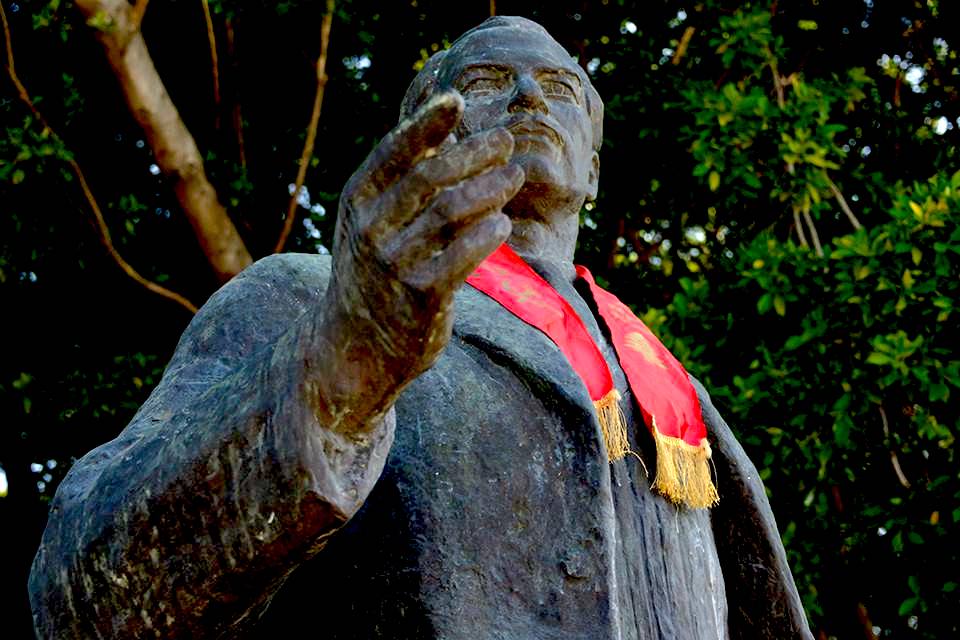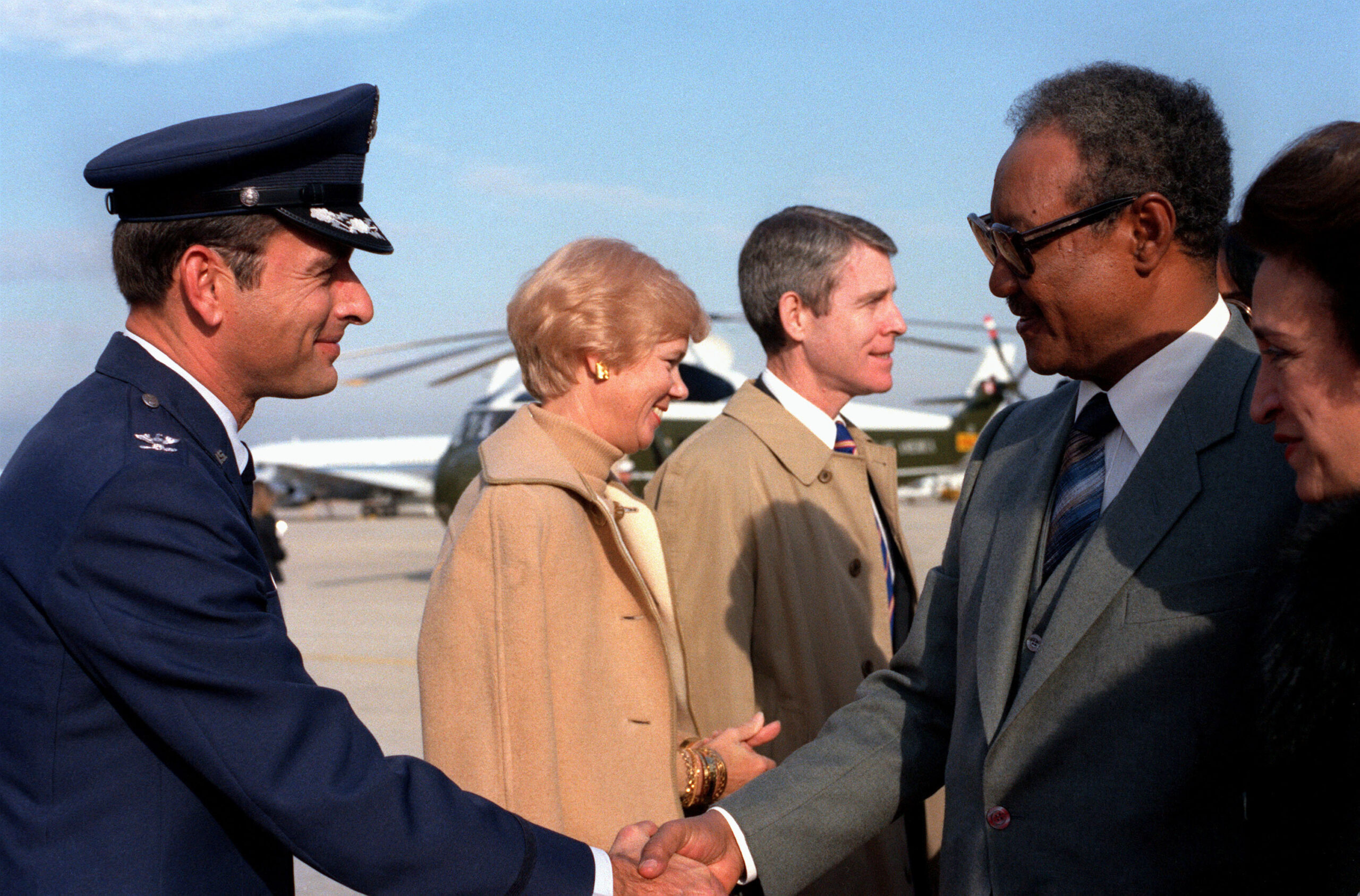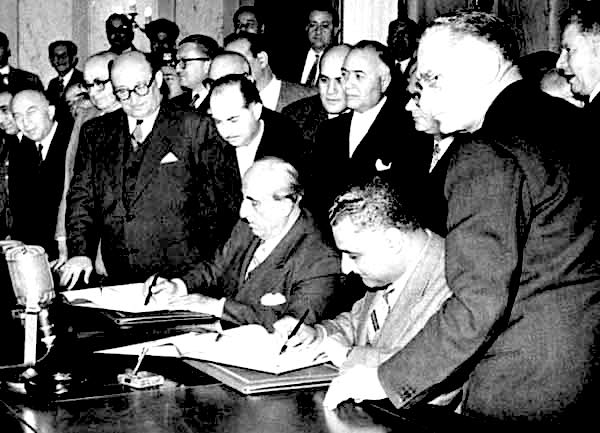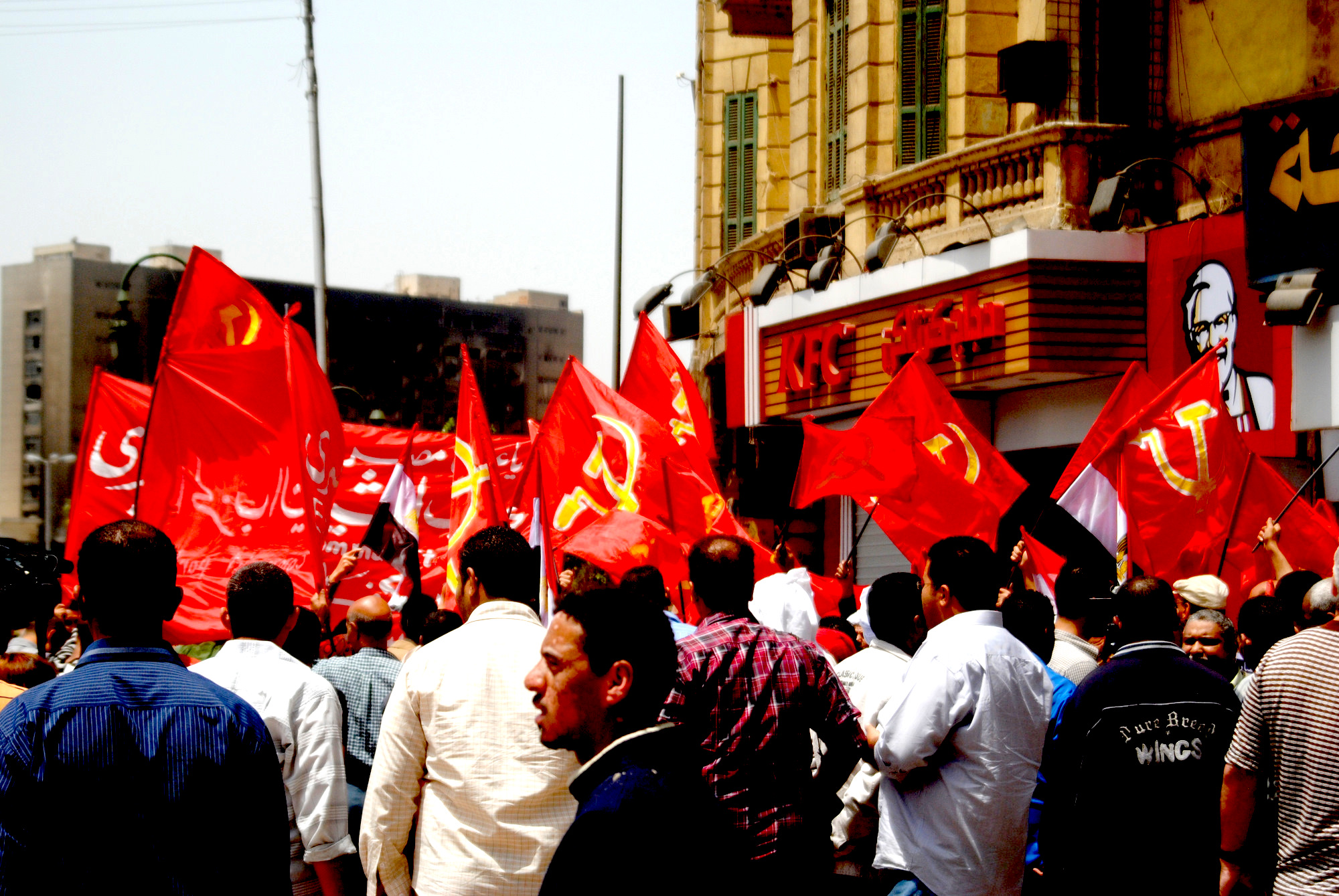The problem started in 1947 with their support for the Soviet-backed partition plan for Palestine. Later, in opposing Arab unity under Nasser, Arab communists placed themselves in the camp of Western imperialism.

Statue of the Lebanese communist leader Farjallah el-Helou in Hosrayel, Lebanon. (Dstever, CC0, Wikimedia Commons)
By As`ad AbuKhalil
Special to Consortium News
 The death of Arab orthodox communism has been a gradual process. It started as early as 1947, when Arab communists — out of strict loyalty to the motherland of communism, the U.S.S.R. — supported the partition plan for Palestine, thereby ceding part of the historic Palestinian homeland to Zionist forces.
The death of Arab orthodox communism has been a gradual process. It started as early as 1947, when Arab communists — out of strict loyalty to the motherland of communism, the U.S.S.R. — supported the partition plan for Palestine, thereby ceding part of the historic Palestinian homeland to Zionist forces.
Arab people were furious that Arab political parties would accept a partial occupation of Palestine — an occupation that necessitated, according to the partition plan — the uprooting of hundreds of thousands of Palestinian natives. Arab communists never recovered and were accused by their Arab nationalist enemies of being out of touch, and even of betrayal.
The organization of Arab communists was tightly in the hands of the Soviet Union, and local communists were expected to comply with Moscow’s wishes regardless of whether those wishes offended Arab political sensibilities. Arab communists have ever since been trying to justify the partition plan and some still defend it.
While Arab nationalist parties and organizations were preaching armed struggle as the only way to recover Palestine, the head of the Lebanese Communist Party, Farajalla Al-Hilu, spoke in 1942 of a “political conflict” with Zionism, not a military one. Arab communists were late in adopting armed struggle — even as a slogan — out of deference to their Soviet sponsors.
Attacked During Cold War
Signs of the decline of Arab communists are everywhere: whether the reasons are indigenous to the movement or external. To be sure, the U.S. and its Western and Gulf allies devoted billions of dollars and arms to undermine Arab communism. From Morocco to Oman, Arab communists were under attack and the U.S. collaborated with the most brutal regimes (as in Indonesia in 1965) to massacre people who were suspected of communist sympathies.
We know the extent to which the U.S. government collaborated with the Iraqi Ba`th and the Sudanese dictatorship of Ja`far Numeiri in their wars on Arab communism in the 1960s (in Iraq) and 1970s (in Sudan).

Prime Minister Gaafar Mohammad Nimeiri of Sudan arriving in U.S. for a state visit, 1983. (US Dod, Michael Tyler, Wikimedia Commons)
In Lebanon, the U.S. armed and financed right-wing forces for many years prior to the civil war in an attempt to exterminate communism from Lebanon.
The private papers of former Lebanese intelligence chief Farid Shihab reveal an extensive private espionage network that was most likely run by the U.S. to monitor and sabotage communism in Lebanon. (Shihab’s papers, released by his daughter, reveal a phobia of communism. They are held at St. Anthony College, Oxford University).
No Local Version of Communism
But Arab communists also betrayed their own cause: they never strove to develop their own version of local communism and did not, in their indoctrination campaigns, attempt to marry communist ideology with Arab culture and heritage.
Their reading materials covered only the West. They failed to produce programs and agendas that reflected local needs and realties. Progress Publishers (the publishing arm of the U.S.S.R.) produced Arabic translations of communist literature, but the translations were woefully inadequate and censorship was employed in the translations.
Support CN’s Spring Fund Drive
Even the Arabic version of the Communist Manifesto was censored (see the introduction to the Arabic translation by Al-`Afif Al-Akhdar). The work of Husayn Muruwwah (Materialist Trends in the Arabic-Islamic Philosophy) was a rare attempt at applying a Marxist-Leninist critique in examining the Arab-Islamic heritage. The Palestinian Hanna Batatu was a lone scholar who was never part of a movement. He described himself to me as “an independent Marxist” influenced by Herbert Marcuse under whom he studied at Harvard. Batatu applied Marxist analytical tools and philosophy in his social history of the region.
Instead of recovering from the error of accepting the partition of Palestine (Zionist code for the partial occupation of Palestine), Arab communists opposed other causes dear to Arabs. In the name of vague internationalism, they opposed the cause of Arab unity and nationalism championed by the Egyptian leader Gamal Abdul-Nasser.

Egypt’s President Gamal Abdul-Nasser, seated right, signing unity pact with Syrian President Shukri al-Quwatli, forming the United Arab Republic, Feb. 1, 1958. (Public domain, Wikimedia Commons)
The cause of Arab unity was anathema to Western governments, which invested in foiling all of its plans. Former C.I.A. Arabist Archie Roosevelt admitted in his book For Lust of Knowing that the U.S. government conflated Arab nationalism with communism and fought both with equal vehemence.
In opposing Arab unity and integration under Nasser, Arab communists placed themselves squarely in the camp of Western imperialism.
Refrained from Pan-Arab Project
Furthermore, Arab communists were not consistent in their claims that they opposed Arab nationalism out of ideological commitment to internationalism. They were divided and fragmented in 1964 into Lebanese and Syrian communist parties, which used to operate as one.
Khalid Bakdash, the Syrian communist leader, who hovered over the Lebanese communist party for decades, was elected to the Syrian Parliament in 1954 (the first Arab communist to win an election). But he opposed Nasser’s project of the United Arab Republic (UAR), the unification of Syria and Egypt in 1958.
Bakdash lived in exile in Eastern Europe while Western governments and Gulf despots conspired to bring down the UAR. It collapsed in 1961 when a coup brought the experiment to an end, a coup most likely coordinated with Western powers.
Arab communists also opposed Nasser when he was the champion — in the Arab world and beyond — of the anti-Western camp in the world. At a time when Nasser was leading a real revolution in Egypt, Egyptian communists were joining forces with right-wing parties in calling for political elections. Those elections would have certainly returned the traditional right-wing parties to power.
Nasser, while not a communist, achieved more for the Egyptian working and peasant class, than all the efforts of Arab communists. It was rather inexplicable that communists in Arab countries would not join forces with the most progressive project in the contemporary history of the Arab world.
Later, Egyptian communists had no problem aligning themselves with dictators against the Muslim Brotherhood. Many leftists supported the regime of Abdul-Fattah Sisi in order to undermine the representative powers of the Muslim Brotherhood, who won the first free election in Egyptian history after the collapse of the Husni Mubarak regime in 2011.

Egyptian Communist Party Flags in Tahrir Square, Cairo, May 1, 2011. (Lilian Wagdy, CC BY 2.0, Wikimedia Commons)
Since the collapse of the U.S.S.R., Arab communists have been trying to shed their ideology. In Syria, communist leader Riad Al-Turk called for Western intervention in the Middle East, while the other branch of the Syrian communist party of Khalid Bakdash supported the Syrian regime.
The Iraqi Communist Party joined the occupation council which was set up by the American colonial power after 2003 invasion. Paul Bremer actually praised the Iraqi communists for their cooperation with the occupiers.
The Sudanese Communist Party has recently called for intervention by “the international community” — a sinister code for NATO and its allies.
In Lebanon, the communists have been split. Early in 2005, many Lebanese communists who had been coopted by the right-wing billionaire Rafiq Hariri joined the right-wing coalition known as March 14. Communist Action Organization and the Yasar Dimiqrati (two organizations with Marxist pasts) were a mere tool for Hariri (an MP from Yasar Dimuqrati was elected to parliament in 2005 on the list of the Hariri family).
The mainstream Lebanese Communist Party stayed outside that framework and supported resistance against Israel. But since 2019, the Lebanese Communist Party has developed into another version of a liberal NGO and seems to be copying the model of liberal Yasar Dimuqrati. It even held “coordination sessions” with the right-wing, anti-communist, Phalanges Party, during the protests that followed the Lebanese collapse in 2019.
And in the last two years, the party has distanced itself from the resistance against Israel and bogusly claimed that leftist parties did much of the resistance against Tel Aviv.
There are still active communist parties today in Iraq, Lebanon, Sudan, Morocco, as well as Marxist or progressive leftist parties in many Arab countries. But many are shedding the communist label and picking Che Guevara as their symbol because he is good looking and does not bring up the baggage that Marx or Lenin brings.
Arab communism is dead, and neoliberal forces rise with various slogans — some from the right and some from the left. The cause of the left is more imperative than ever, but Arab communists have become least qualified to carry it out.
As`ad AbuKhalil is a Lebanese-American professor of political science at California State University, Stanislaus. He is the author of the Historical Dictionary of Lebanon (1998), Bin Laden, Islam and America’s New War on Terrorism (2002), The Battle for Saudi Arabia (2004) and ran the popular The Angry Arab blog. He tweets as @asadabukhalil
The views expressed are solely those of the author and may or may not reflect those of Consortium News.
Support CN’s Spring
Fund Drive Today


Another fine article, as always. Thanks.
Interesting observations sir. Most of us, here in the US, are unaware of all of these shenanigans. One thing we know for sure is that, we can not tell who is a plant and who is genuine. These agencies have become too good at subverting real change. People leading the charge for change turns around and sells the country to the western powers. Only then we find out who the traitors are, but by that time it is too late.
Communism & Marxism are always embraced by the Academic Elites. These elites “speak for” the downtrodden masses, at least in their own minds. Unfortunately, they almost always have no actual connection to the downtrodden masses, and values have little to do with the masses values. Pointing this out, rarely works because they blame everyone but themselves when the downtrodden masses want nothing to do with them.
I live in Alberta, Canada. Our socialist (& interestingly communist) party the NDP is lead by Rachael Notley, the daughter of Grant Notley who actually did represent the common man when he led the NDP. Last night I had a conversation with our Janitor about when as child in the 1970’s his uncle met brought Grant Notley to his family home. He also talked about being a member of the Public Service Union for 25 years. Today he wants absolutely nothing to do with the Public Service Union or Rachael Notley as she represents University Academics, and well paid Government Employees, not him.